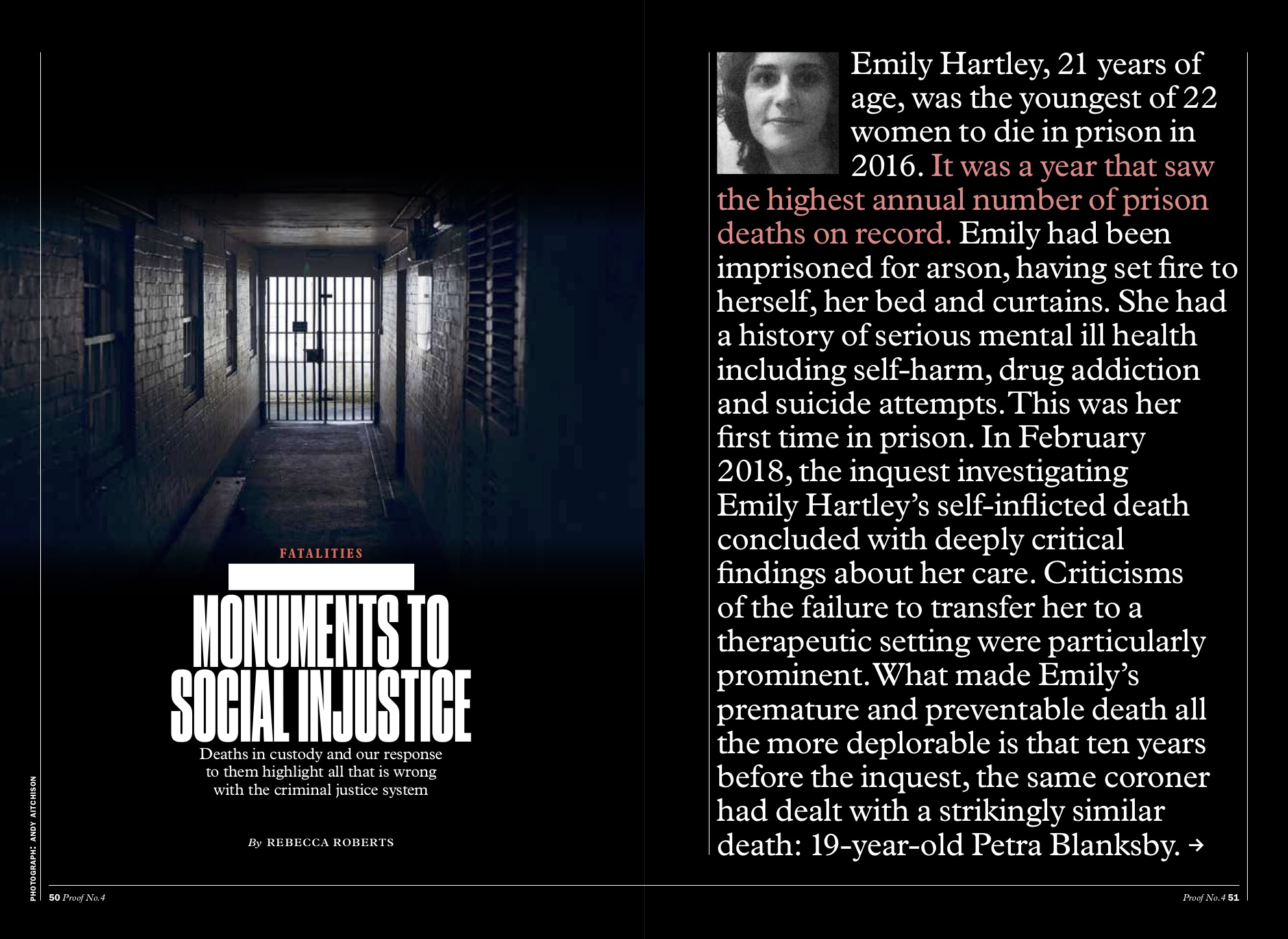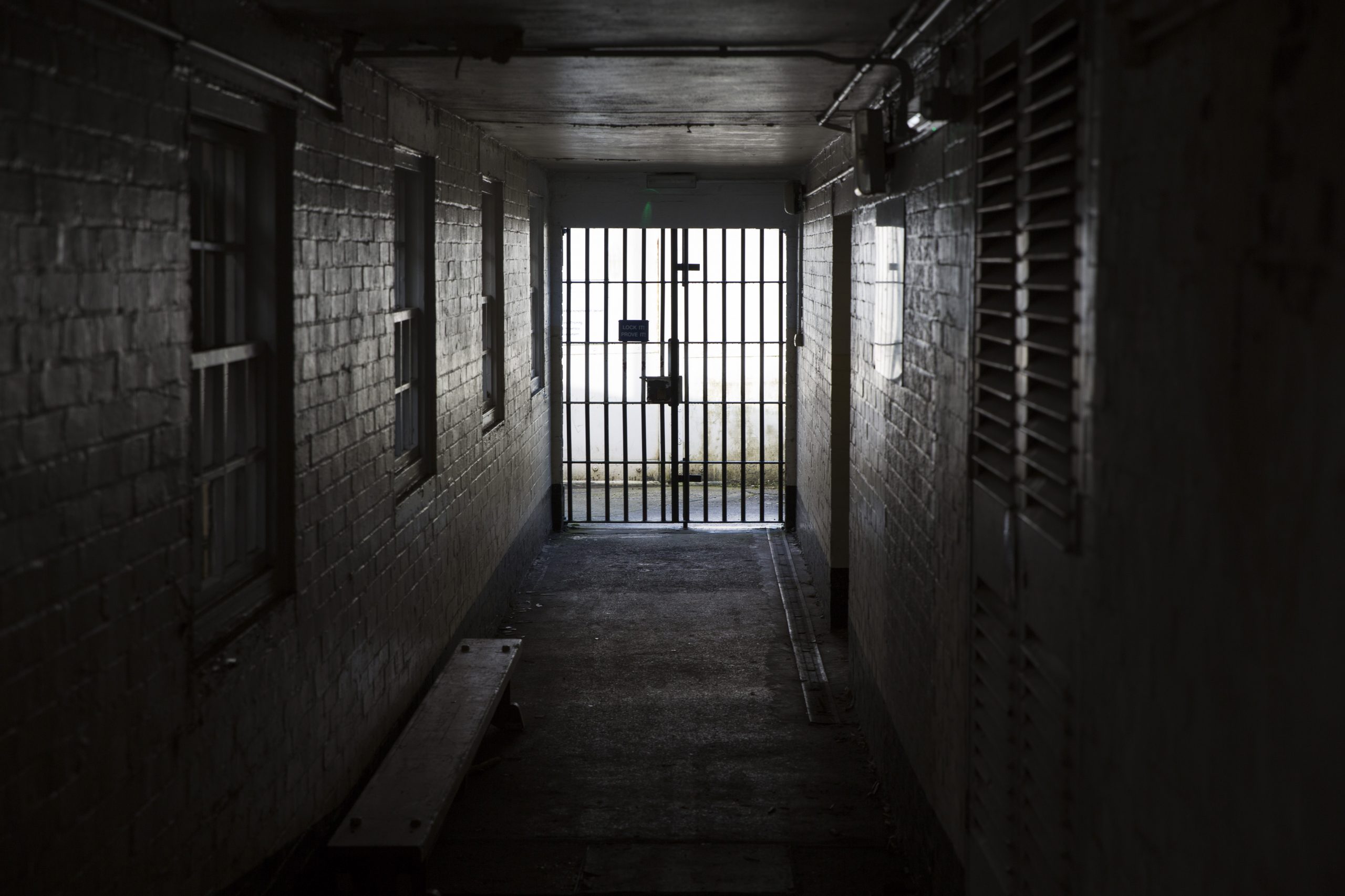As deaths in custody spiral and coroners’ recommendations are ignored, a vicious cycle goes into tailspin. Rebecca Roberts, head of policy at INQUEST, on how preventable deaths and the response to them highlight much that is wrong with the criminal justice system. This article appears in the latest issue of Proof Magazine.
 Emily Hartley, aged 21, was the youngest of 22 women to die in prison in 2016. It was a year that saw the highest annual number of prison deaths on record. Emily had been imprisoned for arson, having set fire to herself, her bed and curtains. She had a history of serious mental ill health including self-harm, drug addiction and suicide attempts. This was her first time in prison.
Emily Hartley, aged 21, was the youngest of 22 women to die in prison in 2016. It was a year that saw the highest annual number of prison deaths on record. Emily had been imprisoned for arson, having set fire to herself, her bed and curtains. She had a history of serious mental ill health including self-harm, drug addiction and suicide attempts. This was her first time in prison.
In February 2018, the inquest investigating Emily’s self-inflicted death concluded with deeply critical findings about her care. Criticisms of the failure to transfer her to a therapeutic setting were particularly prominent. What made Emily’s premature and preventable death all the more deplorable is that ten years (to the day) before the inquest, the same coroner had dealt with a strikingly similar death: 19-year-old Petra Blanksby (below).
Petra, too, had a history of mental ill health and suicide attempts. She had also been imprisoned for arson, having set fire to her bedroom in an attempt to take her own life. At the end of Petra’s inquest in 2008, the coroner recommended to the prison service and department of health that they should deal with the lack of secure therapeutic facilities outside prison.
At the conclusion of Emily’s inquest in 2018, the coroner David Hinchliff wrote: ‘I repeat ten years later that the Prisons Department and the Department of Health should conduct a collaborative exercise to achieve the provision of suitable, secure, therapeutic environments in order to treat those with mental health problems.’

Emily Hartley with her mother, Diane Coulson. Photograph: INQUEST
Two inquests, ten years apart – following on from the deaths of two women who had been criminalised for being mentally unwell. Prisons could not keep either woman safe. Their prison sentences cost them their lives
For almost four decades, INQUEST has worked alongside the families of the men, women and children who have died in prison. Deaths in prison are an unacceptable yet persistent feature of the UK’s criminal justice system. Almost daily, INQUEST learns from bereaved families about deaths in the most appalling conditions. Prisoners are too regularly neglected and left to die alone in their cells because of failures to respond to mental health crises and medical emergencies.
At the heart of many deaths in custody is a person who has been ignored. Some are assumed to be ‘faking it’; in other cases, a crisis is seen as ‘just’ a mental health problem. They are treated as less than human.
*
In 2016, 345 people died in prisons in England and Wales, the highest number on record. This figure represented a 131% increase from the 153 deaths a decade earlier in 2006. After a welcome reduction in 2017, the latest figures from the Ministry of Justice for the 12 months to September 2018 suggest that deaths are rising once again. Of the 325 deaths, 87 were self-inflicted, 165 were non-self-inflicted, five were homicides, and 68 await classification as the circumstances and causes are unclear.
Every four days, a person in prison takes their own life. Instances of self-harm and distress have never been higher. In the 12 months to June 2018, there were almost 50,000 instances of self-harm, an increase of 20%. This works out at 188 incidents a day.
Mark Saunders, whose son Dean died at HMP Chelmsford in 2016, told a parliamentary committee a year later: ‘In this country we do not give a death sentence, but for everyone who has taken their life in prison that is exactly what they got.’
Dean had been imprisoned on remand during a mental health crisis. An inquest jury found that neglect contributed to his death, with serious failings in both mental health care and the prison system.
Families’ trauma and grief is often compounded by the devastating news that prison officials often knew about the risk to life. In many cases, they had already been warned about systemic failures yet failed to act upon them.
Natasha Chin, a 39-year-old woman from London, was found unresponsive in her cell at Sodexo-run HMP Bronzefield in July 2016. She had entered the prison less than 36 hours earlier. Her family describe her as a lovely person who enjoyed making people laugh. Natasha had alcohol and drug dependencies, a history of depression and poor physical health. Her medical cause of death related to the effects of vomiting, alongside chronic alcohol and drug dependence.

‘Systematic failure’: Natasha Chin found unresponsive in her cell at HMP Bronzefield in July 2016. Photo: INQUEST
On arrival at the prison, Natasha told staff that she felt unwell. She was placed in the prison’s drug detoxification unit. On the morning of her death, her condition deteriorated. She started to vomit and did not collect her prescribed medication.
Healthcare staff failed to ensure that she received her medication and prison staff did not follow the protocol for welfare concerns. Experts told the inquest that if Natasha’s condition had been monitored and managed properly, she would have received basic treatment and survived.
In December 2018, after hearing three weeks of evidence, an inquest jury concluded that Natasha’s death was caused ‘by a systemic failure through poor governance which led to a lack of basic care.’ Neglect, the jury decided, had played a key role. It was found that Sodexo’s healthcare staff failed to ensure that medical records were checked before medication was administered and to administer medication promptly.
Previous investigations into deaths and numerous inspection reports dating back to at least 2013 have documented longstanding concerns about the healthcare services at Bronzefield. Yet Natasha’s inquest revealed that recommendations were yet to be implemented even at the time of her death. Since then, three more women have also been found unresponsive in cells at Bronzefield.
Natasha should never have been in prison. Instead, she should have been offered drug and alcohol support in a community healthcare setting. Sodexo’s HMP Bronzefield is by far the most expensive women’s prison in England, costing taxpayers more than £65,000 per prison place per year. Despite this, the prison failed to provide Natasha with even a basic standard of care. Urgent action is needed to dismantle failing women’s prisons – and to invest, not in private prison companies, but in specialist women’s services to support women in the community.
Natasha’s death was caused by neglect and indifference in a system unable to protect and care for her. Sodexo and the Ministry of Justice must be held to account for their failure to act upon repeated warnings about unsafe healthcare systems, placing further lives at risk.
Following the inquest Natasha’s sister, Marsha Chin, said: ‘As a family, we have been shocked to learn of the inadequacies of the care provided to her and the fact that prison staff and management could have prevented her untimely death. We can only hope that changes are now made to try to ensure no other family has to lose a loved one in such circumstances.’
*
Not only is the prison system broken, so too are the mechanisms for ensuring democratic accountability and implementing meaningful change. Mental distress, ill health and deaths in prison are a social justice emergency in need of urgent attention.
Prison policies have been exposed as woefully inadequate in providing a safe environment and protecting human life. Many prison deaths are preventable results of the failure of successive governments to take seriously, and act upon, recommendations from official inquiries, post-death investigations and inquests.
Inquests are a crucial way for families to establish the truth surrounding their relatives’ death. A robust, wide-ranging inquest at which families are legally represented is an opportunity to ensure proper scrutiny, uncover unsafe systems or practices, and to identify the action that is required to prevent future deaths.
However, families frequently find themselves up against well-funded legal teams. State agencies and private providers often treat the aftermath of a contentious death as a damage limitation exercise. They therefore focus on minimising responsibility, and defending policies and procedures, rather than trying to find out what went wrong and why.
There is now widespread understanding that the system urgently needs to change. Recent government-commissioned reviews from Bishop James Jones, Dame Elish Angiolini and Professor Simon Wessely all recommend that there should be automatic non-means-tested public funding for all bereaved families at inquests following a state-related death. This position has also been also been supported by the chief coroner, the Bach Commission, the Corston Review and the joint committee on human rights.
As a result, a groundswell of support to level the playing field and end the current inequality of arms has emerged. The government is expected to consult on new guidance soon. This marks a unique opportunity to uphold bereaved families’ rights, whilst also safeguarding others’ lives.
Inquest after inquest has highlighted systemic failures and the inappropriate use of prison for a range of individuals who simply should not be there. A stream of post-death investigations, inspectorate and monitoring reports, and official inquiries into prisons have produced evidence-based recommendations into what needs to change. Too many of these have been systematically ignored.
The lack of an independent body tasked with the statutory duty to collate, analyse and monitor the implementation of official recommendations relating to custodial deaths and prison safety means that opportunities to save lives are missed. INQUEST has long called for the creation of a national oversight mechanism on deaths in custody.

By their very nature, prisons are dehumanising places which create and intensify vulnerability. This is exacerbated by separation from family and friends, endemic violence, fear, bullying, lack of meaningful activity, boredom and isolation.
Deaths in prison are at the sharp end of a continuum of neglect, inadequate mental health support and systemic failures in healthcare, experienced by people with existing complex social, health and economic problems. In attempting to address the ‘prison crisis’, it is important to understand the crushing reality of imprisonment in the context of social inequality and injustice.
Prisons have historically held a disproportionate number of those least well served by society: the poor, the mentally ill, the homeless, those from BME backgrounds. Over recent years, inequality and distress have increased across society, against a backdrop of austerity and social abandonment. Prison is increasingly used as a mechanism to deal with ‘social problems’. Budget cuts within prisons have worsened conditions, intensifying pre-existing risks to safety and life.
Across the political spectrum the current ‘crisis’ facing prisons has been articulated as one of understaffing, underfunding, violence and drugs. However, these so-called ‘problems’ are better understood as symptoms of the overuse of imprisonment and punishment to tackle issues of poverty, inequality and mental illness, alongside a basic failure to treat prisoners with humanity, dignity and compassion. Prisons are not just ‘in crisis’, they are places of crisis.
Deaths have always been endemic in the prison system. This speaks to the reality of prisons not as places of ‘reform’, but rather as dumping grounds for social problems like mental ill health, addiction, poverty and homelessness.
These issues can only be addressed with long term, decisive action that targets the excessive and inappropriate use of custody. The government must halt the prison-building programme, tackle sentencing policy, promote well-funded alternatives to custody, and invest in healthcare, social housing and education. The evidence is clear: these actions would be vastly more effective, economically rational and socially just than resorting to imprisonment.
Criminal justice resources should be reallocated away from prisons to well-funded, well-staffed community alternatives, involving drug, alcohol and mental health services. Welfare, health and social care in the community is both a humane and sustainable response to dealing with social problems, which cannot meaningfully be addressed through the criminal justice system.
Angela Davis, articulated such a vision in her 2003 book Are Prisons Obsolete?: ‘imagine a constellation of alternative strategies and institutions with the ultimate aim of removing the prison from the social and ideological landscapes of our society.’
Rather than acting as places where justice is restored, prisons are monuments to social injustice. They expose a woeful lack of imagination and ambition to take seriously and address harm and crime in society. To do so would involve looking far beyond the prison walls – to building a social and economic infrastructure that meets people’s needs and shields them from harm. This is a vision that is both practical and possible.







